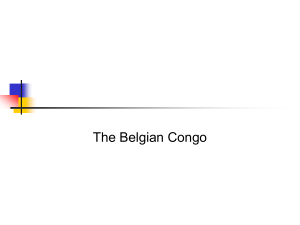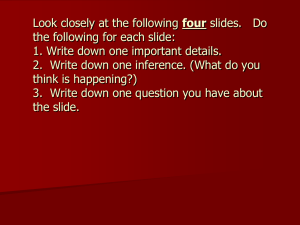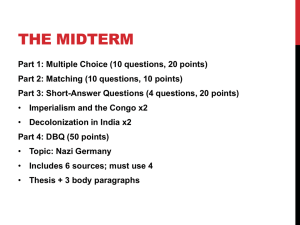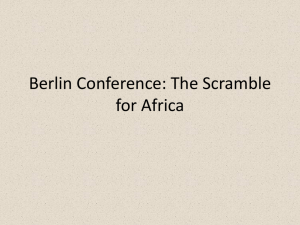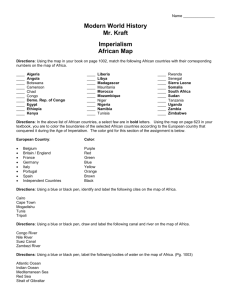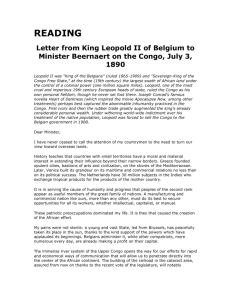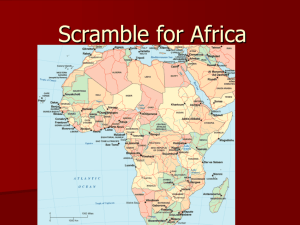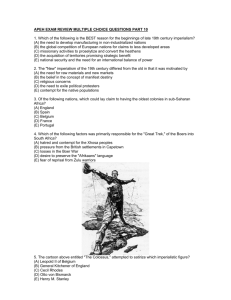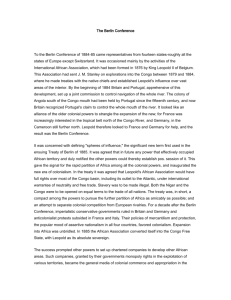World History 2 European Imperialism Packet Mr. Ackerman
advertisement
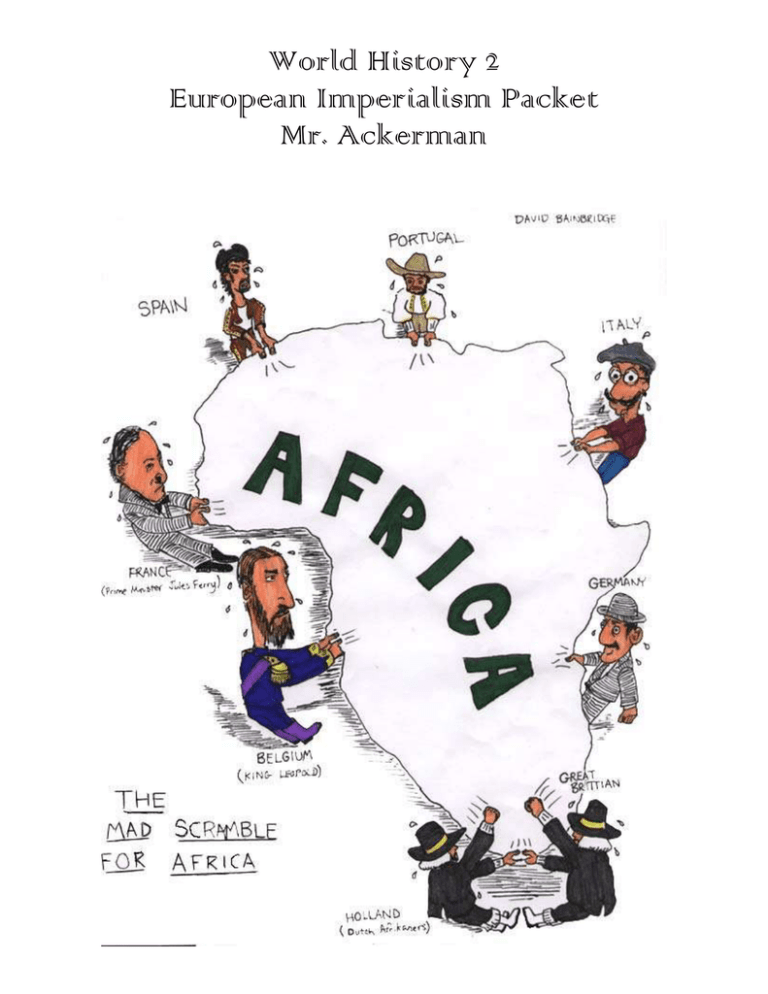
World History 2 European Imperialism Packet Mr. Ackerman European Imperialism in Africa (Overview) Members of the expedition of British explorer Henry Morton Stanley fight off aggressors during one of his many journeys on the African continent. Stanley also explored the Congo region on behalf of Belgian king Leopold II, whose desire for the region's natural resources motivated him to establish his own personal colony, the Congo Free State. [Library of Congress] In the late 1800s, the great European powers once again invaded Africa. However, this time they did not plunder its human resources. This time their actions were spurred by imperialism—by the desire for global domination. Europe's second coming to Africa was for its vast natural resources to meet the needs of the newly industrialized nations of Europe. This scramble for Africa involved the traditional colonial powers France and Great Britain; reinvigorated colonial powers Spain and Portugal; newly formed states Italy and Germany; and one individual, King Leopold II of Belgium. By 1914, almost all of African soil belonged to a European power. Only Liberia—a country formed by freed American slaves—and Ethiopia escaped Europe's grasp. Berlin Conference The Berlin West Africa Conference, also known as the Berlin Conference, was held from November 15, 1884 to January 20, 1885. The great European powers—France, Great Britain, Germany, Portugal, Belgium, Italy, and Spain—and the United States met in Berlin, Germany to divide the African continent into colonial holdings. There were no Africans in attendance. The conference agreed that 1) any sovereign power that wanted to claim any territory should inform the other powers "in order to . . . make good any claim of their own," 2) any such annexation should be validated by effective occupation, and 3) treaties with African rulers were to be considered a valid title to sovereignty. This was the first time in world history that one continent boldly declared its plans to occupy and distribute the territory of another continent. In addition, the conference recognized Leopold II as the sovereign of a new state, the Congo Free State. In fact, the Congo Free State was his personal colony—a private state owned exclusively by Leopold. Congo Free State Leopold II had begun to put together the Congo Free State in 1877 when he formed the Committee for Studies of the Upper Congo following British explorer Henry Morton Stanley's exploration of the area. Leopold II directed Stanley to negotiate with local rulers, and by 1884, Stanley had signed treaties with 450 independent African entities representing 905,000 square miles of territory. Occupying almost all of the Congo River basin, the Congo Free State was 80 times the size of Belgium—three and half times the size of Texas! Its chief industry was wild rubber production. To gain this precious commodity, the Belgians imposed rubber quotas on each of the villages. As the demand for rubber rose higher and higher, the quotas were also raised higher and higher. Refusal to work or failure to meet the quotas often met with beatings, mutilation, and even death. Another tactic to force the Congolese to "work rubber" was to punish one's loved ones—the price of not working rubber might be the safety or even the life of one's relatives, spouse, or children. It is estimated that during the time Leopold II ruled the Congo Free State, its population was reduced by some 50%. The population of the territory is said to have declined from 20 or 30 million to 8 million. Indeed, Leopold II built up a huge private fortune through the control of the Congo's vast resources. However, international criticism of the brutal treatment of the Congolese finally forced Leopold II to give up his control of the Congo. He turned it over to the Belgian nation in 1908, and the area became a colony called the Belgian Congo. It was administered by Belgium's parliament until it was granted independence in 1960. Formerly known as Zaire, today the area is called Congo or Democratic Republic of Congo. Impact of Colonialism While Leopold II's actions in the Congo were not necessarily typical of those that occurred in other areas of Africa, the ruthless exploitation that occurred during Europe's scramble for Africa nevertheless resulted in profound, lasting changes for the continent. It destroyed the continent's traditional social, economic, political, and cultural structures. Disease, starvation, and brutality decimated African populations. It created economic dependency on industrialized nations and institutionalized national and international racism against Africans and peoples of African descent. Overall, it resulted in underdevelopment and poverty. Today's Africans continue to struggle to overcome the legacy of colonialism and achieve freedom and respect. MLA Citation "European Imperialism in Africa (Overview)." World History: The Modern Era. ABC-CLIO, 2011. Web. 15 Dec. 2011. What did Europeans have to do to “own” the lands they claimed in Africa? Does this seem reasonable? Why were the Belgians so interested in the Congo? What impact do the Belgians have on the Congo over time? Map of the Partition of Africa by European Countries _______________________________________________________ _______________________________________________________ _______________________________________________________ _______________________________________________________ _______________________________________________________ _______________________________________________________ _______________________________________________________ _______________________________________________________ _______________________________________________________ _________________________________________ _________________________________________ ______________________________________________ ______________________________________________ ______________________________________________ ______________________________________________ ______________________________________________ ______________________________________________ ______________________________________________ ______________________________________________ ______________________________________________ ______________________________________________ Berlin Conference _________________________________________ ______________________________________________ ______________________________________________ ______________________________________________ ______________________________________________ ______________________________________________ Ethiopia ______________________________________________ ______________________________________________ ______________________________________________ _______________________________________________________ ______________________________________________ _______________________________________________________ ______________________________________________ _______________________________________________________ _________________________________________ _______________________________________________________ _______________________________________________________ _______________________________________________________ _______________________________________________________ _______________________________________________________ _______________________________________________________ ______________________________________________ _________________________________________ ______________________________________________ ______________________________________________ ______________________________________________ ______________________________________________ ______________________________________________ ______________________________________________ ______________________________________________ ______________________________________________ _______________________________________________________ ______________________________________________ _______________________________________________________ ______________________________________________ _______________________________________________________ _________________________________________ _______________________________________________________ _______________________________________________________ _______________________________________________________ _______________________________________________________ _______________________________________________________ _______________________________________________________ ______________________________________________ _________________________________________ _______________________________________________________ _______________________________________________________ _______________________________________________________ _______________________________________________________ _______________________________________________________ _______________________________________________________ _______________________________________________________ _______________________________________________________ _______________________________________________________ ______________________________________________ _________________________________________ _______________________________________________________ _______________________________________________________ _______________________________________________________ _______________________________________________________ _______________________________________________________ _______________________________________________________ _______________________________________________________ _______________________________________________________ _______________________________________________________ ______________________________________________ _______________________________________________________ _________________________________________ _______________________________________________________ _______________________________________________________ _______________________________________________________ _______________________________________________________ _______________________________________________________ _______________________________________________________ _______________________________________________________ _______________________________________________________ ______________________________________________ _______________________________________________________ _________________________________________ _______________________________________________________ _______________________________________________________ _______________________________________________________ _______________________________________________________ _______________________________________________________ _______________________________________________________ _______________________________________________________ _______________________________________________________ ______________________________________________ _________________________________________ Map of the British Empire “The sun never sets on the British Empire” 1. Using the map, explain what this saying means? 2. How could a small nation like Britain gain such a large empire? Types of Imperialism Spheres of Influence Direct Control Indirect Control Protectorate Economic Imperialism Which one seems to be most effective from the European perspective? Who does the octopus represent? What is the motivation for the octopus? What is the octopus attempting to do to these different countries? Why is he interested in so many different areas? Why do you think that England feels justified in doing what it’s doing? On this map, color and label all 12 countries (and the Suez Canal) that the English were attempting to control. You may need to do some research in order to find their locations. European Colonization Efforts British v. Dutch v. Zulus Shaka – Ethiopia v. Russia/France/Italy/England Menelik II – British v. Egypt Suez Canal – Boers – Boer War – Great Trek – British v. China British v. India British East India Company – British Raj – Sepoys – Sepoy Rebellion – Opium War – United States v. Japan Commodore Matthew Perry – Taiping Rebellion – Meiji Era – Spheres of Influence – Boxer Rebellion –
